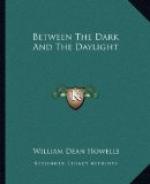Nothing of all the beauty seemed lost upon the girl, so bereft that she could enjoy no part of it from association. Lanfear observed that she was not fatigued by any such effort as he was always helplessly making to match what he saw with something he had seen before. Now, when this effort betrayed itself, she said, smiling: “How strange it is that you see things for what they are like, and not for what they are!”
“Yes, it’s a defect, I’m afraid, sometimes. Perhaps—”
“Perhaps what?” she prompted him in the pause he made.
“Nothing. I was wondering whether in some other possible life our consciousness would not be more independent of what we have been than it seems to be here.” She looked askingly at him. “I mean whether there shall not be something absolute in our existence, whether it shall not realize itself more in each experience of the moment, and not be always seeking to verify itself from the past.”
“Isn’t that what you think is the way with me already?” She turned upon him smiling, and he perceived that in her New York version of a Parisian costume, with her lace hat of summer make and texture and the vivid parasol she twirled upon her shoulder, she was not only a very pretty girl, but a fashionable one. There was something touching in the fact, and a little bewildering. To the pretty girl, the fashionable girl, he could have answered with a joke, but the stricken intelligence had a claim to his seriousness. Now, especially, he noted what had from time to time urged itself upon his perception. If the broken ties which once bound her to the past were beginning to knit again, her recovery otherwise was not apparent. As she stood there her beauty had signally the distinction of fragility, the delicacy of shattered nerves in which there was yet no visible return to strength. A feeling, which had intimated itself before, a sense as of being in the presence of a disembodied spirit, possessed him, and brought, in its contradiction of an accepted theory, a suggestion that was destined to become conviction. He had always said to himself that there could be no persistence of personality, of character, of identity, of consciousness, except through memory; yet here, to the last implication of temperament, they all persisted. The soul that was passing in its integrity through time without the helps, the crutches, of remembrance by which his own personality supported itself, why should not it pass so through eternity without that loss of identity which was equivalent to annihilation?
Her waiting eyes recalled him from his inquiry, and with an effort he answered, “Yes, I think you do have your being here and now, Miss Gerald, to an unusual degree.”
“And you don’t think that is wrong?”
“Wrong? Why? How?”
“Oh, I don’t know.” She looked round, and her eye fell upon her father waiting for them in his carriage beside the walk. The sight supplied her with the notion which Lanfear perceived would not have occurred otherwise. “Then why doesn’t papa want me to remember things?”




